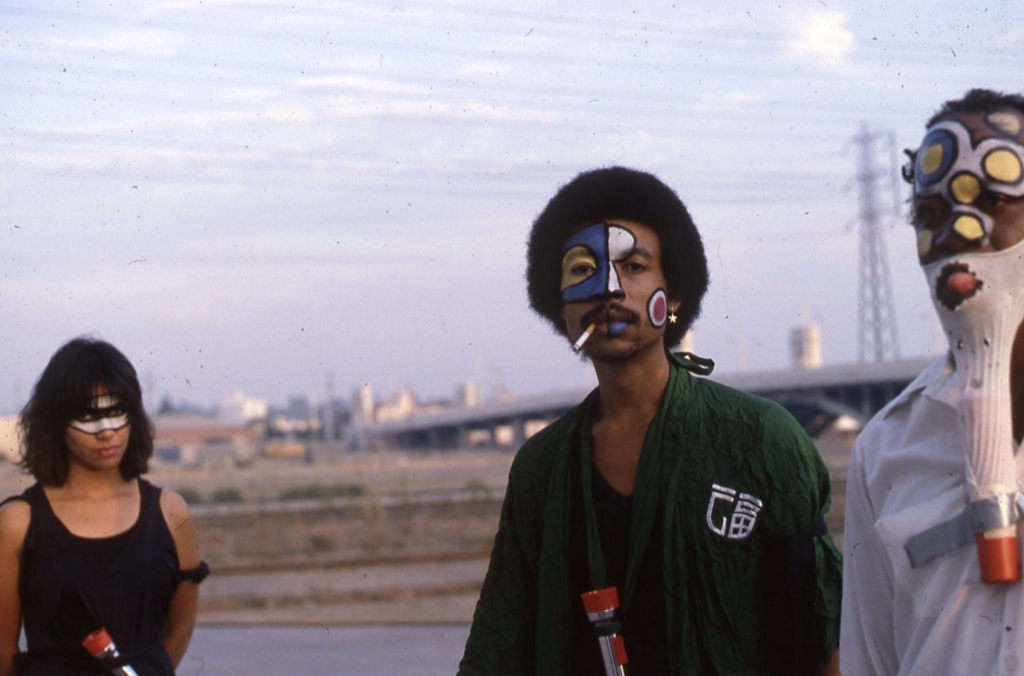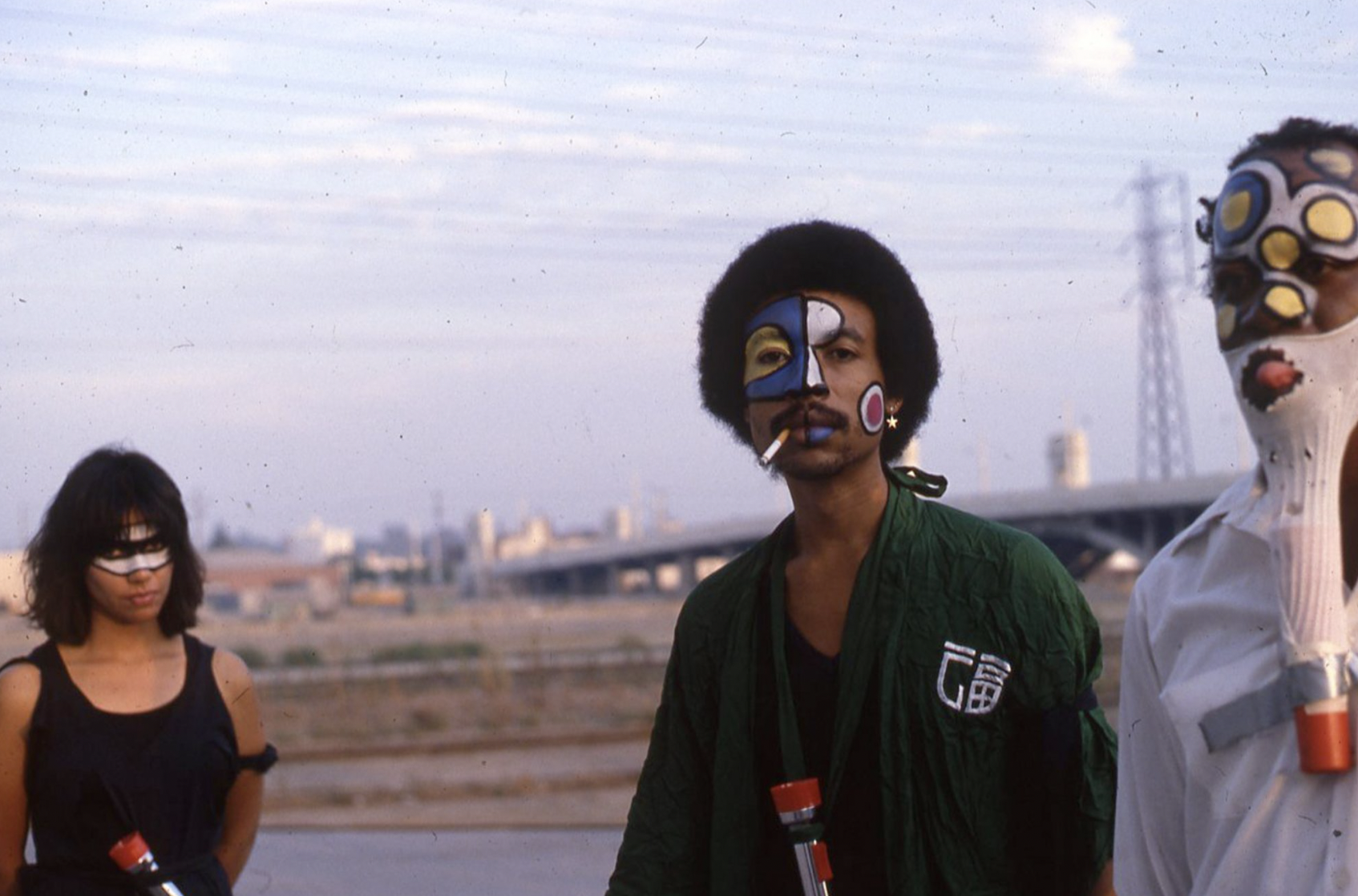Text by Christopher Michael

Ulysses Jenkins, writing on his approach to art-making in the memoir Doggerel Life, states that: Those familiar with the ancients have all recognized and resonated as artists to the role of the shaman. Through those ancestral references, I began to realise my character and identity: the contemporary griot became my model.
Throughout his expansive career, Jenkins has referred to himself as a Video Griot – creating a lineage that ties his practice to the traditional West African bards and poets. Griots were a class of storytellers and performers responsible for passing on folk tales, music, and poems, acting as historians and preserving their culture in certain West African communities.
Jenkins’ work functions similarly to the traditional griot, though instead of conventional storytelling he utilizes video and digital methods for ritual and myth-making, updating traditional methods for his contemporary American audience. The artist’s work is best read through the lens of technologically mediated ritualism, which ties traditional practices to digital methods and attempts to expand towards a cosmic consciousness.
Besides, Jenkins interest in digital rituals and technological spirituality is apparent in the Philadelphia Institute of Contemporary Art’s (ICA) retrospective of his work, Without Your Interpretation which run until the end of 2021. The retrospective, the first of its kind for Jenkins, expanded on over 50 years of the artist’s work and incorporated a range of media from sculpture and photography to performance and video.
While the media changed throughout the exhibition, Jenkins’ work remained continually concerned with making sense of and meditating on his role as a black man in multiracial American society. This sense-making is often done through the creation of rituals and an interest in non-western spiritual practices, tying them to contemporary concerns through modern means.

This combination of influences can perhaps best be seen in the 1983 video work for which the exhibition is titled, Without Your Interpretation. The video combines performance and found footage through Jenkins’ unique experimental video aesthetic while centring a performance by Jenkins and his band.
Various clips of third-world countries, news footage of cultural events, and performances from Jenkins Othervisions collaborators are interwoven as the music plays. At the same time, Jenkins’ voice guides through the tapestry of images.
The video gives viewers a space for meditation, reflecting on the American tendency to overlook the struggles of third-world countries despite living in an increasingly global age — among other things. Jenkins invokes his ancestry throughout the video, tying modern issues to a greater world historical heritage.
Gene Youngblood, a contemporary of Jenkins who briefly appeared in his video work Televiews and Cable Radio, wrote in Expanded Cinema that in the 20th and 21st centuries, We must move from oceanic consciousness to cosmic consciousness.
Youngblood was discussing the idea that we must move from the pre-20th century understanding of the world and towards an understanding that given our new methods of communications, the earth has become a global village.
Jenkins materializes this concept in his video work, recognizing the ability of new media to connect communities and reorient our consciousness towards the cosmic and global. Thus, Jenkins’s work embodies Youngblood’s concept of cosmic consciousness as his practice interweaves international concerns with the ancestral to come to these new conclusions.
In this way, Jenkins’s work has predicted many of the prominent digital communication methods today. For instance, in Documenta 9 Video Phone Performance, Jenkins and his Othervisions Art Band projected a performance from Santa Monica to Documenta 9 in Kassel, Germany.
The work incorporates psychedelic visuals and projections and was exemplary of an early cyberdelic aesthetic that has become increasingly popular in the following decades. Still, in the second song of the performance, “King to King”, Jenkins and his band specifically addressed police brutality and anti-black racism, presenting these issues to a global audience.
Utilizing new media methods and aesthetics, Jenkins attempts to expand viewers’ consciousness bringing attention simultaneously to anti-black racism and to the possibilities of the virtual world.
As accessibility to and new understandings of technology emerge, Jenkins’ work acts as a reminder that digital communications can tie us to the ancestral, create rituals, and think with a global mindset. Jenkins explores how digitality can expand our collective memory in these ways, connecting us simultaneously to the ancestral past and towards a cosmic future.
The Philadelphia ICA’s retrospective showcased how Jenkins’s work interweaves his concerns as an individual in America with his concerns as a global citizen, using ritual and invoking ancestrality to explore these notions.
Therefore, Jenkins is a forefather to our increasingly digital age, guiding how we might use technology to expand our understanding of the world while acknowledging our past. A retrospective contextualized and spotlighted Jenkins’ work within contemporary discourse, reminding us of the radical possibilities for digital communication and new media.






